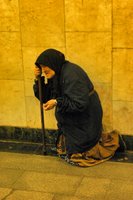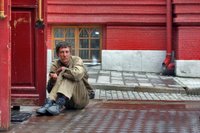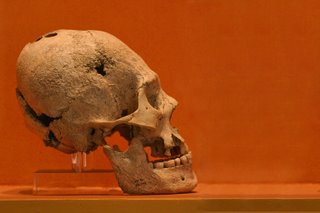 Before any type of precipitous and offensive condemnations assail the following commentary, allow me to say that, on the average, I admire and respect beauty for its essential and aesthetic reason alone, as this photograph testifies. This does not preclude me from forming an opinion about my experience after having been exposed to such beauty, especially since taste, and experience itself, are nothing but subjective matters. Such an opinion cannot be molded in a social vacuum, however. What I present is nothing but a perspective having been sculpted by the reality of my social experience, or, at least, what I felt during my observations of such beauty and at the time I wrote the piece. As I write this now, I am convinced that there is something more fulfilling, something more real than what I saw. Had I experienced it, the bulk of the commentary would have become nothing but a simple footnote.
Before any type of precipitous and offensive condemnations assail the following commentary, allow me to say that, on the average, I admire and respect beauty for its essential and aesthetic reason alone, as this photograph testifies. This does not preclude me from forming an opinion about my experience after having been exposed to such beauty, especially since taste, and experience itself, are nothing but subjective matters. Such an opinion cannot be molded in a social vacuum, however. What I present is nothing but a perspective having been sculpted by the reality of my social experience, or, at least, what I felt during my observations of such beauty and at the time I wrote the piece. As I write this now, I am convinced that there is something more fulfilling, something more real than what I saw. Had I experienced it, the bulk of the commentary would have become nothing but a simple footnote. It is also important to point out that, because of its political connotations, the following commentary is not an example in liberty of opinion, but an exercise in exposing the double standards that plague society. I am neither advocating for nor presenting a solution. What I do is simply present an observation; completely subjective, somewhat subversive, and perhaps a subtle example of subliminal perception. Please, allow yourself to be the judge.
A Trip
Two weeks of a badly planned trip to Western and Eastern Europe amounted, most of the time, to the mediocre sightseeing (for which I only have myself to blame) of some of the most ostentatious architectural structures ever created, ranging from imperial castles and small noble quarters to imposing cathedrals purporting to represent the greatness of god. I photographed some of them for historical and archeological reasons. Of the meager and vulnerable contemporary quarters of the common people, if they ever existed, I photographed nothing, because no map or summary in tourist travel guides suggested that they ever did. Yet, their descendants begging on the street for a few coins, even during the redemptive era of capitalist opportunity, remain faithful historians. God, I suppose, refuses to provide shelter to these people or remains busy guarding the flamboyant castles and churches after millennia of upper class abduction. Perhaps it was god herself begging on the street, a constant and paradoxical reminder that one has to look beyond the obvious and touristy to gather a better understanding of a country’s culture.
When majestic buildings were destroyed during war or communistic oppression, some were rebuilt to a larger tha n life reality of their previous existence. For purposes redemptive of such past, communist statues in Budapest should have been destroyed, or, better yet, as such action would have rendered all the significance of occupation as meaningless, they should have found their way into a museum with the solid intention of reminding potential deniers that the country indeed suffered a so-called occupation. These statues, however, were not destroyed after liberation, but simply removed from the city and re-edified, not in a museum, but in a remote park à la Disneyland where curious vacationers paying the touristy entrance fee of 2500 Hungarian Forints can satiate their thirst of first hand knowledge—while also having the opportunity to buy a T-shirt mocking the three tenors, or the other way around, if one is to succumb to the marketing campaign depicting Lenin, Stalin and Mao as the “Three Terrors.” The seductive qualities of capitalism with their respective marketing schemes have been more powerful and redemptive than the educated amusement—and education—that a museum can provide, I suppose.
n life reality of their previous existence. For purposes redemptive of such past, communist statues in Budapest should have been destroyed, or, better yet, as such action would have rendered all the significance of occupation as meaningless, they should have found their way into a museum with the solid intention of reminding potential deniers that the country indeed suffered a so-called occupation. These statues, however, were not destroyed after liberation, but simply removed from the city and re-edified, not in a museum, but in a remote park à la Disneyland where curious vacationers paying the touristy entrance fee of 2500 Hungarian Forints can satiate their thirst of first hand knowledge—while also having the opportunity to buy a T-shirt mocking the three tenors, or the other way around, if one is to succumb to the marketing campaign depicting Lenin, Stalin and Mao as the “Three Terrors.” The seductive qualities of capitalism with their respective marketing schemes have been more powerful and redemptive than the educated amusement—and education—that a museum can provide, I suppose.
Moving to the west, in Bavaria, to be exact, one can find Neuschwanstein, a castle that enjoys fairy tale celebrity with the imprimatur of none other than Disney, which used it—paying the rights?—for the ubiquitous promotional that has so obsessed the infantile minds of children and adults who believe the disneyfied depiction of reality. From Sleeping Beauty to Cinderella to Disney itself, the exuberantly portrayed silhouette of this castle, in conjunction with astounding pyrotechnics and an enthusiastic musical score on the background, has been the representative image for this corporation. If one knew the history of the castle, all disneyfied meaning would be spoiled, but that is a matter of another piece.
On my way to Munich, before meeting face to face with Neuschwanstein, I encountered  the fairy tale theme on the plane while watching an in-flight movie, not a film, about James Braddock, a lower class boxer who was nicknamed the Cinderella Man for vicariously representing Irish redemption during The Great Depression, given that he rose from pugilistic oblivion to defeat the heavy weight champion in America at the time: Max Baer. Braddock, the movie shows, was a simple and good man, honest, incorruptible, and perfectly capable to forgo food even during the night of the fight to a mercilessly depicted Baer in order to give it to his own children. After seeing all those castles in Europe, especially the Cinderella castle, I wondered if the house that Braddock bought in Jersey with the money he earned after the fight with Baer would ever become a tourist trap in 300 years.
the fairy tale theme on the plane while watching an in-flight movie, not a film, about James Braddock, a lower class boxer who was nicknamed the Cinderella Man for vicariously representing Irish redemption during The Great Depression, given that he rose from pugilistic oblivion to defeat the heavy weight champion in America at the time: Max Baer. Braddock, the movie shows, was a simple and good man, honest, incorruptible, and perfectly capable to forgo food even during the night of the fight to a mercilessly depicted Baer in order to give it to his own children. After seeing all those castles in Europe, especially the Cinderella castle, I wondered if the house that Braddock bought in Jersey with the money he earned after the fight with Baer would ever become a tourist trap in 300 years.
I have to admit that as someone with strong inclinations towards the socio-historical context of reality, archeological sites provide fascination and a solid reference point.
Archeological sites, I suppose, at some point become arcane. Most of the time, they seem to do it when their significance is too close in time with the reality of subjects who observe them. Not without reason, there have been several revolutionary attempts to destroy the significance that imperial structures represent, the actions of the Boston Tea Party being but simply one example. To whom does reality belong? To whom does historical knowledge?
In
Tired of castles, monuments and mausoleums, I embarked my unpreserved body back home, unable to reconcile my expectations about the trip with my experience, but already planning another trip to territories where perhaps the magnificence of undeveloped land would be the majestic attraction. A photo-essay depicting sand dunes that I saw in a Swiss Air magazine I found at the Munich airport seemed to serendipitously corroborate my belief that Africa should be my subsequent destination. Yet, memories of my unfinished trip still bothered me. The foreknowledge of several vacuous hours of flight worsened my frustration. I had to study for an upcoming make-up exam on research methods, but I could not gather the strength to go over research design, random sampling or ethical considerations when my experience had been arbitrarily skewed to see that which an artificial portrayal of history imposed on me.
After a few minutes of 16 Blocks, I changed the channel because Bruce Willis was again playing himself, or one of his roles in the Die Hard series, which is basically the same. Flipping through channels, a female British voice seduced me: “Remember, remember, the fifth of November, the gunpowder treason and plot. I know of no reason why the gunpowder treason should ever be forgot.” Serendipitously, I found the reconciliation to the frustration that had anguished me.
V for Vendetta is a film, not a movie, about an anarchical concept personified by V, who in turn personifies Guy Fawkes, one of several co-conspirators who attempted to blow up the British parliament on
As you can imagine, I loved the film, for its anarchical meaning and because it provided me with the reconciliation I was searching for. After this film, my trip became vindicated. At least vicariously, I was able to blow up all those structures that rendered my trip meaningless and whose arbitrary significance so troubled me—even with awesome fireworks and the great 1812 Overture by Tchaikovsky, which Disney would have probably approved of.
As reality is sinking in, however, I now have to develop the courage to see a film in which Yale frat boys blow up Mayan archeological sites in the name of national security.
Wait a minute! For that I need not wait for a lame screenplay, but simply tune in to reality and move the location from
(Does anyone want to argue about Terrorism?).




























